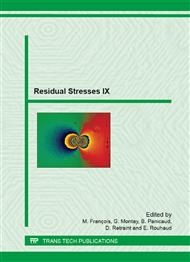[1]
ASTM E837 − 13a. Standard Test Method for Determining Residual Stresses by the Hole-Drilling Strain-Gage Method. (2013).
DOI: 10.1520/e0837-13
Google Scholar
[2]
M. Beghini, L. Bertini, C. Santus. A procedure for evaluating high residual stresses using the blind hole drilling method, including the effect of plasticity. Journal of Strain Analysis for Engineering Design 45 (2010), 301-318.
DOI: 10.1243/03093247jsa579
Google Scholar
[3]
M. Beghini, C. Santus, E. Valentini, A. Benincasa. Experimental verification of the hole drilling plasticity effect correction. Materials Science Forum 681 (2011), 151-158.
DOI: 10.4028/www.scientific.net/msf.681.151
Google Scholar
[4]
E. Valentini, C. Santus, M. Bandini. Residual stress analysis of shot-peened aluminum alloy by fine increment hole-drilling and X-ray diffraction methods. Procedia Engineering 10 (2011), 3582-3587.
DOI: 10.1016/j.proeng.2011.04.589
Google Scholar
[5]
E. Valentini, M. Beghini, L. Bertini, C. Santus, M. Benedetti. Procedure to perform a validated incremental hole drilling measurement: Application to shot peening residual stresses. Strain 47 (2011), Suppl. 1, e605-e618.
DOI: 10.1111/j.1475-1305.2009.00664.x
Google Scholar
[6]
E. Valentini, A. Benincasa, C. Santus. Bending test rig for validating the hole drilling method residual stress measurement. Materials Science Forum 768-769 (2014), 150-157.
DOI: 10.4028/www.scientific.net/msf.768-769.150
Google Scholar
[7]
E. Procter, E.M. Beaney. Trepan or Ring Core Method, Centre-Hole Method, Sach's Method, Blind Hole Methods, Deep Hole Technique. Adv in Sur Treat, Technol - Appl - Eff. Residual Stresses. 4 (1987) 165-198.
DOI: 10.1016/b978-0-08-034062-3.50019-7
Google Scholar
[8]
W. Böhm, E. Stücker, H. Wolf. Principles and potential applications of the ring-core method for determining residual stresses. RAM. 4 (1988) 5-10.
Google Scholar
[9]
J. Václavík, O. Weinberg, P. Bohdan, J. Jankovec, S. Holý. Evaluation of Residual Stresses using Ring Core Method. EPJ Web of Conferences 6, 44004 (2010) p.1-p.6.
DOI: 10.1051/epjconf/20100644004
Google Scholar
[10]
S. Keil. On-line evaluation of measurement results during the determination of residual stress using strain gages. RAM. 9 (1995) 15-20.
Google Scholar
[11]
E. Valentini, A. Benincasa, L. Bertelli. Un sistema automatico per la misura delle tensioni residue con il metodo della cava anulare. 40° convegno AIAS. (2011).
Google Scholar
[12]
A. Ajovalasit, G. Petrucci, B. Zuccarello. Determination of Nonuniform Residual Stresses Using the Ring-Core Method. Journal of Engineering Materials and Technology, Transactions of the ASME 118 (1996) 224-228.
DOI: 10.1115/1.2804891
Google Scholar
[13]
B. Zuccarello. Optimization of depth increment distribution in the ring-core method. Journal of Strain Analysis for Engineering Design. 31 (1996) 251-258.
DOI: 10.1243/03093247v314251
Google Scholar
[14]
A. Civín, M. Vlk. Ring-Core Residual Stress Measurement: Analysis of Calibration Coefficients for Incremental Strain Method. Bulletin of Applied Mechanics 6 (2010), 77-83.
Google Scholar
[15]
A. Civín, M. Vlk. Determination of principal residual stresses' directions by incremental strain method. Applied and Computational Mechanics 5 (2011) 5-14.
Google Scholar


